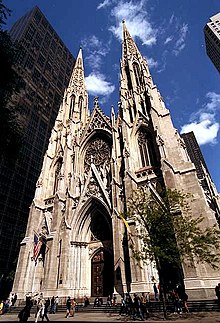St. Patrick's Cathedral (Manhattan)
| St. Patrick's Cathedral | |
|---|---|

View of the cathedral from Fifth Avenue
|
|
| Location |
Midtown Manhattan, New York City |
| Country | United States |
| Denomination | Roman Catholic |
| Tradition | Latin Rite |
| Website | www |
| History | |
| Dedication | October 5, 1910 |
| Earlier dedication | May 29, 1879 |
| Architecture | |
| Status | Cathedral |
| Functional status | Active |
| Architect(s) | James Renwick, Jr. |
| Style | Decorated Neo-Gothic |
| Specifications | |
| Length | 396.7 feet (120.9 m) |
| Number of spires | 2 |
| Spire height | 329.5 feet (100.4 m) |
| Bells | 19 (29,122.73 lbs) |
| Administration | |
| Archdiocese | Archdiocese of New York |
| Clergy | |
| Archbishop | Timothy Michael Cardinal Dolan |
| Rector | Rev. Msgr. Robert T. Ritchie |
| Laity | |
| Director of music | Dr. Jennifer Pascual |
| Organist(s) | Daniel Brondel Michael Hey |
| RCIA coordinator | Sueanne Nilsen |
|
St. Patrick's Cathedral Complex
|
|
|
Location in New York City
|
|
| Coordinates | 40°45′31″N 73°58′35″W / 40.75861°N 73.97639°WCoordinates: 40°45′31″N 73°58′35″W / 40.75861°N 73.97639°W |
| Area | 2 acres (0.81 ha) |
| Built | 1878 |
| NRHP Reference # | 76001250 |
| Significant dates | |
| Added to NRHP | December 8, 1976 |
| Designated NHL | December 8, 1976 |
| Designated NYCL | October 19, 1966 |
The Cathedral of St. Patrick (commonly called St. Patrick's Cathedral) is a decorated Neo-Gothic-style Roman Catholic cathedral church in the United States and a prominent landmark of New York City. It is the seat of the archbishop of the Roman Catholic Archdiocese of New York, and a parish church, located on the east side of Fifth Avenue between 50th and 51st Streets in Midtown Manhattan, directly across the street from Rockefeller Center and specifically facing the Atlas statue.
The land on which the present cathedral sits was purchased in 1810. The Jesuit community built a college on the site, three miles north of the city. It contained a "fine old house," which was fitted with a chapel of St. Ignatius. The school closed in 1814 and the Jesuits sold the lot to the diocese. In 1813, the diocese gave use of the property to Dom Augustin LeStrange, abbot of a community of Trappists (from the original monastery of La Trappe) who came to America fleeing persecution by French authorities. In addition to a small monastic community, they also looked after some thirty-three orphans. With the downfall of Napoleon in that year, the Trappists returned to France in 1815, abandoning the property. The property at this point was designated for a future cemetery. The neighboring orphanage was maintained by the diocese into the late nineteenth century. Some of the Trappists resettled to Canada and eventually founded St. Joseph's Abbey in Spencer, Massachusetts.
...
Wikipedia



